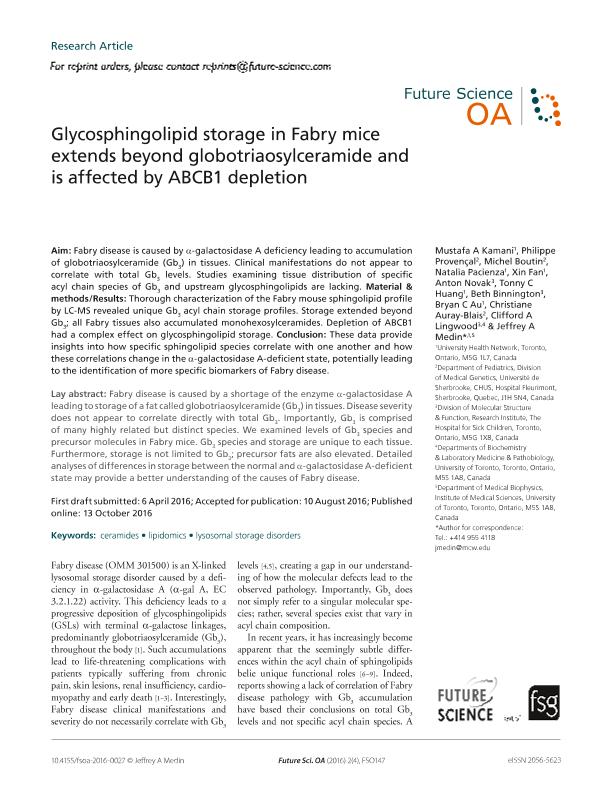Artículo
Glycosphingolipid storage in Fabry mice extends beyond globotriaosylceramide and is affected by ABCB1 depletion
Kamani, Mustafa A; Provençal, Philippe; Boutin, Michel; Pacienza, Natalia Alejandra ; Fan, Xin; Novak, Anton; Huang, Tonny C.; Binnington, Beth; Au, Bryan C.; Auray Blais, Christiane; Lingwood, Clifford A; Medin, Jeffrey A.
; Fan, Xin; Novak, Anton; Huang, Tonny C.; Binnington, Beth; Au, Bryan C.; Auray Blais, Christiane; Lingwood, Clifford A; Medin, Jeffrey A.
 ; Fan, Xin; Novak, Anton; Huang, Tonny C.; Binnington, Beth; Au, Bryan C.; Auray Blais, Christiane; Lingwood, Clifford A; Medin, Jeffrey A.
; Fan, Xin; Novak, Anton; Huang, Tonny C.; Binnington, Beth; Au, Bryan C.; Auray Blais, Christiane; Lingwood, Clifford A; Medin, Jeffrey A.
Fecha de publicación:
10/2016
Editorial:
Future Medicine
Revista:
Future Science
ISSN:
2056-5623
Idioma:
Inglés
Tipo de recurso:
Artículo publicado
Clasificación temática:
Resumen
Aim: Fabry disease is caused by α-galactosidase A deficiency leading to accumulation of globotriaosylceramide (Gb3) in tissues. Clinical manifestations do not appear to correlate with total Gb3 levels. Studies examining tissue distribution of specific acyl chain species of Gb3 and upstream glycosphingolipids are lacking. Material & methods/Results: Thorough characterization of the Fabry mouse sphingolipid profile by LC-MS revealed unique Gb3 acyl chain storage profiles. Storage extended beyond Gb3; all Fabry tissues also accumulated monohexosylceramides. Depletion of ABCB1 had a complex effect on glycosphingolipid storage. Conclusion: These data provide insights into how specific sphingolipid species correlate with one another and how these correlations change in the α-galactosidase A-deficient state, potentially leading to the identification of more specific biomarkers of Fabry disease. Lay abstract Fabry disease is caused by a shortage of the enzyme α-galactosidase A leading to storage of a fat called globotriaosylceramide (Gb3) in tissues. Disease severity does not appear to correlate directly with total Gb3. Importantly, Gb3 is comprised of many highly related but distinct species. We examined levels of Gb3 species and precursor molecules in Fabry mice. Gb3 species and storage are unique to each tissue. Furthermore, storage is not limited to Gb3; precursor fats are also elevated. Detailed analyses of differences in storage between the normal and α-galactosidase A-deficient state may provide a better understanding of the causes of Fabry disease.
Palabras clave:
Ceramides
,
Lipidomics
,
Lysosomal Storage Disorders
Archivos asociados
Licencia
Identificadores
Colecciones
Articulos(OCA HOUSSAY)
Articulos de OFICINA DE COORDINACION ADMINISTRATIVA HOUSSAY
Articulos de OFICINA DE COORDINACION ADMINISTRATIVA HOUSSAY
Citación
Kamani, Mustafa A; Provençal, Philippe; Boutin, Michel; Pacienza, Natalia Alejandra; Fan, Xin; et al.; Glycosphingolipid storage in Fabry mice extends beyond globotriaosylceramide and is affected by ABCB1 depletion; Future Medicine; Future Science; 2; 4; 10-2016
Compartir
Altmétricas



